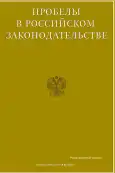On Topical Issues of Counterterrorism in the Russian Federation: Criminal Legal Aspect
- Authors: Kodzokov B.V.1
-
Affiliations:
- North Caucasus Institute for Advanced Studies (branch) of the Krasnodar University of the Ministry of Internal Affairs of Russia
- Issue: Vol 15, No 4 (2022)
- Pages: 187-192
- Section: Articles
- URL: https://journal-vniispk.ru/2072-3164/article/view/147552
- ID: 147552
Cite item
Abstract
Modern globalization also has a number of negative consequences, among which it is worth highlighting the prevalence of individual crimes, which, against the background of an active dialogue between states, have become transnational in nature and the relevance of combating them is no longer limited to individual geopolitical regions. This is what terrorism which has long affected most states of the world, is like nowadays. Of course, for some regions the problem of combating terrorism is more relevant due to a number of factors that contribute to the development of terrorist organizations on their territory, for others it is less relevant, and affects some countries only indirectly. However, these patterns are temporary, and therefore all international organizations and national law enforcement structures are currently working on counter-terrorism mechanisms. In modern domestic and foreign legal literature, there are many studies on the problems of terrorism. Some authors focus on countering certain types of terrorism (religious terrorism, cyberterrorism, etc.), others pay special attention to the problems of improving international and domestic legislation in this area, and others evaluate the effectiveness of modern mechanisms for countering terrorism. However, considering the complexity of the analyzed criminal act, it seems necessary to explore modern mechanisms for countering terrorism, taking into account the theoretical and legal foundations of this process and the achievements of law enforcement practice in this area. In addition, it seems appropriate not to limit ourselves to the national system of combating terrorism in Russia and to analyze international standards on the stated issues. To achieve this goal, it is necessary to solve the following scientific, practical and methodological problems in the following areas: the study of the theoretical and legal foundations of countering terrorism in the modern world; study of the current legal framework for countering terrorism; consideration of international legal and national mechanisms for counterterrorism; study of the national system of counterterrorism in the Russian Federation.
Keywords
Full Text
##article.viewOnOriginalSite##About the authors
Beslan Valerievich Kodzokov
North Caucasus Institute for Advanced Studies (branch) of the Krasnodar University of the Ministry of Internal Affairs of Russia
Email: kodzokov_bes1981@mail.ru
police major, Lecturer at the Department of Organization of Law Enforcement Activities Nalchik, Russia
References
- The Constitution of the Russian Federation: adopted by popular vote on December 12, 1993 (subject to amendments made by the Laws of the Russian Federation on amendments to the Constitution of the Russian Federation of December 30, 2008 No. 6-FKZ, of December 30, 2008 No. 7-FKZ, of 05.02. 2014 No. 2-FKZ, dated July 21, 2014 No. 11-FKZ) // Rossiyskaya Gazeta. 1993. No. 237. December 25; SZ RF. 2014. No. 31. Art. 4398.
- Federal Law No. 115-FZ of 07.08.2001 (as amended on 04.23.2022) “On counteracting the legalization (laundering) of proceeds from crime and the financing of terrorism” // SZ RF. 2001. No. 33 (part I). Art. 3418; 2018. No. 18. Art. 2560.
- Criminal Code of the Russian Federation No. 63-FZ dated June 13, 1996 (as amended on November 12, 2018) // SZ RF. 1996. No. 25. Art. 2954; 2018. No. 47. Art. 7141.
- Global Terrorism Index. Encyclopedia of the Humanities: Research // Center for Humanitarian Technologies, 2006-2019. URL: https://gtmarket.ru/ratings/global-terrorism-index/info (date of access: 03/29/2022).
- Declaration on measures to eliminate international terrorism (adopted on December 9, 1994 by Resolution 49/60 at the 84th plenary session of the UN General Assembly) // Current international law. T. 3. M.: Moscow Independent Institute of International Law, 1997. Р. 90 - 94.
- Agreement on Cooperation between the States Members of the Commonwealth of Independent States in the fight against terrorism // URL: http://docs.cntd.ru/document/901824672 (date of access: 03/10/2022).
- Council of Europe Convention on the Prevention of Terrorism (CETS No. 196) [Russian, English] (Concluded in Warsaw on May 16, 2005) (as amended on October 22, 2015) // SZ RF. 2009. No. 20. Art. 2393.
- International Convention for the Suppression of the Financing of Terrorism (Concluded in New York on December 9, 1999) // Bulletin of International Treaties. 2003. No. 5.
- European Union counter-terrorism coordinator // https://www.consilium.europa.eu/en/policies/fight-against-terrorism/counter-terrorism-coordinator/ (accessed 10.04.2022).
- Kirilenko V.P., Alekseev G.V. Counteraction to the ideology of modern terrorism // Administrative consulting. 2018. No. 5 (113). Р. 8-18.
- Kodzokova L.A., Kumysheva M.K. International legal mechanisms for countering terrorism // Eurasian Law Journal. 2022. No. 2 (165). Р. 432-434.
Supplementary files








